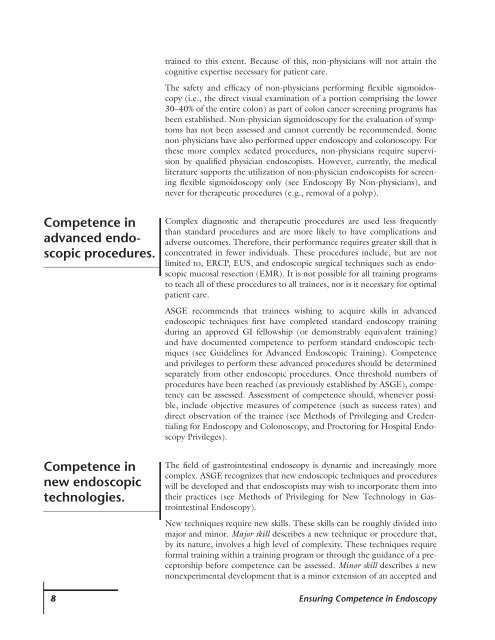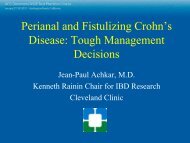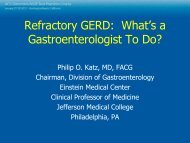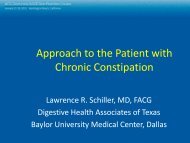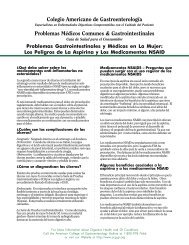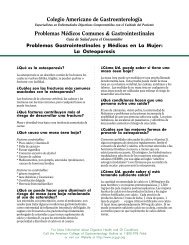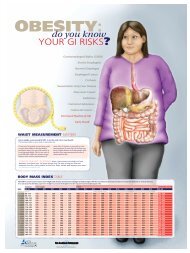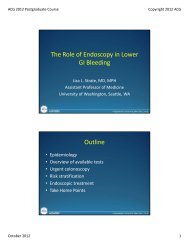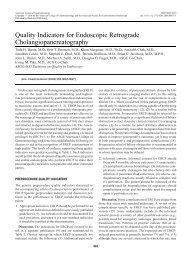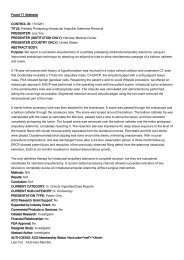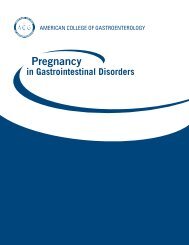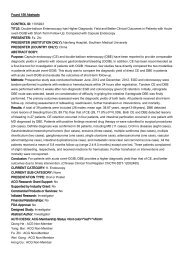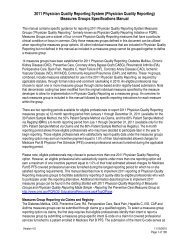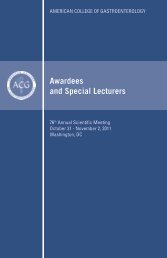Ensuring Competence in Endoscopy - American College of ...
Ensuring Competence in Endoscopy - American College of ...
Ensuring Competence in Endoscopy - American College of ...
Create successful ePaper yourself
Turn your PDF publications into a flip-book with our unique Google optimized e-Paper software.
tra<strong>in</strong>ed to this extent. Because <strong>of</strong> this, non-physicians will not atta<strong>in</strong> the<br />
cognitive expertise necessary for patient care.<br />
The safety and efficacy <strong>of</strong> non-physicians perform<strong>in</strong>g flexible sigmoidoscopy<br />
(i.e., the direct visual exam<strong>in</strong>ation <strong>of</strong> a portion compris<strong>in</strong>g the lower<br />
30–40% <strong>of</strong> the entire colon) as part <strong>of</strong> colon cancer screen<strong>in</strong>g programs has<br />
been established. Non-physician sigmoidoscopy for the evaluation <strong>of</strong> symptoms<br />
has not been assessed and cannot currently be recommended. Some<br />
non-physicians have also performed upper endoscopy and colonoscopy. For<br />
these more complex sedated procedures, non-physicians require supervision<br />
by qualified physician endoscopists. However, currently, the medical<br />
literature supports the utilization <strong>of</strong> non-physician endoscopists for screen<strong>in</strong>g<br />
flexible sigmoidoscopy only (see <strong>Endoscopy</strong> By Non-physicians), and<br />
never for therapeutic procedures (e.g., removal <strong>of</strong> a polyp).<br />
<strong>Competence</strong> <strong>in</strong><br />
advanced endoscopic<br />
procedures.<br />
<strong>Competence</strong> <strong>in</strong><br />
new endoscopic<br />
technologies.<br />
Complex diagnostic and therapeutic procedures are used less frequently<br />
than standard procedures and are more likely to have complications and<br />
adverse outcomes. Therefore, their performance requires greater skill that is<br />
concentrated <strong>in</strong> fewer <strong>in</strong>dividuals. These procedures <strong>in</strong>clude, but are not<br />
limited to, ERCP, EUS, and endoscopic surgical techniques such as endoscopic<br />
mucosal resection (EMR). It is not possible for all tra<strong>in</strong><strong>in</strong>g programs<br />
to teach all <strong>of</strong> these procedures to all tra<strong>in</strong>ees, nor is it necessary for optimal<br />
patient care.<br />
ASGE recommends that tra<strong>in</strong>ees wish<strong>in</strong>g to acquire skills <strong>in</strong> advanced<br />
endoscopic techniques first have completed standard endoscopy tra<strong>in</strong><strong>in</strong>g<br />
dur<strong>in</strong>g an approved GI fellowship (or demonstrably equivalent tra<strong>in</strong><strong>in</strong>g)<br />
and have documented competence to perform standard endoscopic techniques<br />
(see Guidel<strong>in</strong>es for Advanced Endoscopic Tra<strong>in</strong><strong>in</strong>g). <strong>Competence</strong><br />
and privileges to perform these advanced procedures should be determ<strong>in</strong>ed<br />
separately from other endoscopic procedures. Once threshold numbers <strong>of</strong><br />
procedures have been reached (as previously established by ASGE), competency<br />
can be assessed. Assessment <strong>of</strong> competence should, whenever possible,<br />
<strong>in</strong>clude objective measures <strong>of</strong> competence (such as success rates) and<br />
direct observation <strong>of</strong> the tra<strong>in</strong>ee (see Methods <strong>of</strong> Privileg<strong>in</strong>g and Credential<strong>in</strong>g<br />
for <strong>Endoscopy</strong> and Colonoscopy, and Proctor<strong>in</strong>g for Hospital <strong>Endoscopy</strong><br />
Privileges).<br />
The field <strong>of</strong> gastro<strong>in</strong>test<strong>in</strong>al endoscopy is dynamic and <strong>in</strong>creas<strong>in</strong>gly more<br />
complex. ASGE recognizes that new endoscopic techniques and procedures<br />
will be developed and that endoscopists may wish to <strong>in</strong>corporate them <strong>in</strong>to<br />
their practices (see Methods <strong>of</strong> Privileg<strong>in</strong>g for New Technology <strong>in</strong> Gastro<strong>in</strong>test<strong>in</strong>al<br />
<strong>Endoscopy</strong>).<br />
New techniques require new skills. These skills can be roughly divided <strong>in</strong>to<br />
major and m<strong>in</strong>or. Major skill describes a new technique or procedure that,<br />
by its nature, <strong>in</strong>volves a high level <strong>of</strong> complexity. These techniques require<br />
formal tra<strong>in</strong><strong>in</strong>g with<strong>in</strong> a tra<strong>in</strong><strong>in</strong>g program or through the guidance <strong>of</strong> a preceptorship<br />
before competence can be assessed. M<strong>in</strong>or skill describes a new<br />
nonexperimental development that is a m<strong>in</strong>or extension <strong>of</strong> an accepted and<br />
8 <strong>Ensur<strong>in</strong>g</strong> <strong>Competence</strong> <strong>in</strong> <strong>Endoscopy</strong>


